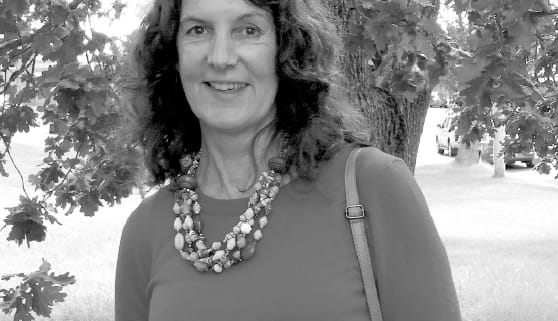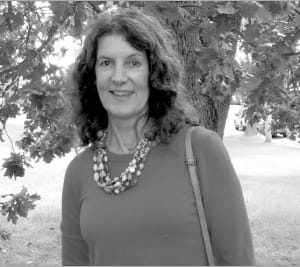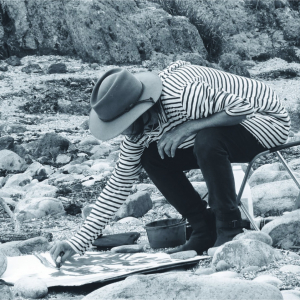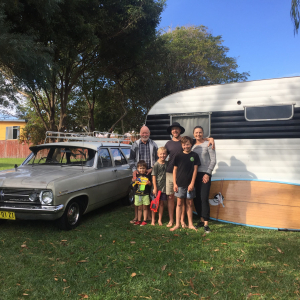Linda Chapman: a profile of a priest
A small table, softly moving leaves, flecking dappled light, a large ginger biscuit shared and a conversation with a quietly remarkable woman. Reverend Linda Chapman is a priest, a contemplative and an activist. She is the spiritual guide at the Open Sanctuary at Tilba Tilba. She is humble, deep, warm, immersed and focused, with a penetrating mind, soft smile and fiercely compassionate heart.
It was an unpredicted path that led Linda to this place in life—a priest ‘at the Catholic end of the Anglican spectrum’. To her, the choice of ordination was a surprise. She says the decision came from a profound experience with the Eucharist, an experience she rekindles when she celebrates Mass.
Why are you a priest?
‘Living in the ACT, I worked with youth. It was very hard and I burnt out with glandular fever and pneumonia, which led to chronic fatigue; I came back here and had an inexplicable encounter with Christ.
‘Various individuals, communities and events led me to orient my life this way.
‘Jeff Bollard, from Batemans Bay, was fantastic. He gave me a pile of books about contemplative mysticism which led me to the church and to a framework for life. Then I lived in Catholic retreat communities and explored religious life. Clinical Pastoral Education gave me a connection with a Franciscan friar who raised the question of ordination. I was unconvinced, but took a step back and thought, ‘see what opens’. I pulled out of the course and came to Narooma.
‘There is a strong family link with religious life. My mum’s great-great-grandfather was the first Anglican bishop in Newcastle. And when I drove past All Saints church at Bodalla, I’d have a physical reaction—‘I need to give attention to this’—and I did. Bishop Browning was a strong influence in the decision to take ordination. I trained for priesthood for two years at St John’s in the Hunter Valley and then finished in Canberra and completed a theology degree from Charles Sturt University.’
Contemplative life
‘It was contemplative life that attracted me, not parish work, so I chose Tilba. Clericalism with its tendency to fall into the institution and role is not what draws me, it can move away from the essence of that which we are trying to open up’.
Linda leads retreats and ‘quiet days’ at Open Sanctuary, Tilba Tilba, which she describes as ‘more spacious within, not pushing’. She aims to mirror the experience of living in a religious community and cites ‘solitude and in-community’, ‘the regular rhythm of prayer’, ‘being together makes something available for others’.
‘It provides a place of held silence and contemplative experience of the mystery which is at the heart of life’.
What is needed in these times, personally and for the planet?
Her eyes become teary, her hand reaches up to the leaves beside her head, softly she speaks—‘It’s this—nature. We need to reconnect with nature, and the practice of silence’.
Theologically, she says, ‘Original sin is distraction, and so becoming scattered, living one side of ourselves. Nature is reality—recognising our interconnection, interdependence. In these times we need to centre on the deep mind, the wisdom mind. We need the self-conscious mind to be influenced by the deep mind and then wait with intention. Quiet days, silence, open us to the deep mind, to recovery of contemplative and mystical roots. The capacity to address the mind is in the centre of Buddhist and Christian mysticism. At Open Sanctuary it was already there.’
What/who are your key influences to embrace mysticism?
‘Bishop Jeff Browning enabled my contemplative orientation. The capacity of Bede Griffith to bridge east and west influenced me, and reading mystics like Julian of Norwich, John of the Cross. I am an Oblate of Christian Community, a member of a community which is attached to a particular order such as Franciscan, Benedictine. Bridging mystic wisdom into our world lies in-community, like a Christian meditative community.
‘The pathway to bring mystic wisdom into the present world is long, slow and winding. The contemplative-mind-in-action is important for urgent issues like environment, mental health, climate change. I am a contemplative and also an activist. We need a spiritual practice to do this, a daily reminder, an inner space.’
Where do you get hope and inspiration?
‘For me, hope comes from action—and attention to the ways we act as this can be part of the problem. And to be present to life as it is, here and now. And solidarity with others is important—including the other than human. And seeing life in all its beauty and brokenness and be there to what is.’
Ro Beaumont



